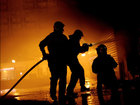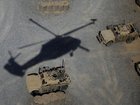A Turkish court issued arrest warrants for seven active generals and admirals pending trial over an alleged plot to overthrow the Islamist-rooted government, Anatolia news agency said Monday.
The suspects included Generals Nusret Tasdeler, the head of the army's educational command and Ismail Hakki Pekin, the intelligence chief of the general staff, NTV news channel said.
 Full Story
Full Story
A Soviet-made plane carrying 36 passengers Monday overshot the runway and lost one wing in an emergency landing in Russia's Far East, injuring 15 people.
The An-24 passenger plane, en route to Far Eastern city of Khabarovsk, had to land in Blagoveschensk after it "deviated from the planned itinerary due to poor visibility and strong gusts of wind," the emergencies ministry said in a statement.
 Full Story
Full Story
A Muslim man died on Sunday after setting himself on fire inside a mosque in the French city of Toulouse, local officials said, saying the man was psychologically disturbed.
The man, in his fifties, suffered burns over 90 percent of his body and died in hospital, the local prefect's office said.
 Full Story
Full Story
A bomb attack on Monday wounded at least 10 Pakistani soldiers in the Taliban and al-Qaida hotspot of Waziristan on the Afghan border, officials said.
The device was detonated by remote control as a military vehicle passed through the Sararogha village area in the mountains of South Waziristan, which is part of Pakistan's semi-autonomous tribal district.
 Full Story
Full Story
Towering waves from a tropical storm threatened to hit a chemical plant in a Chinese port city, raising fears it might lead to a toxic chemical spill, a Chinese state media report said Monday.
Waves as high as 65 feet (20 meters) broke a dike in Dalian in northeastern Liaoning province and threatened to hit the compound of Fujiahua chemical plant where toxic chemicals were held, Xinhua News Agency said, citing soldiers at the scene.
 Full Story
Full Story
A helicopter which crashed killing 30 U.S. troops in Afghanistan was shot down after the Taliban laid a trap to lure U.S. forces into the area, an Afghan government official said Monday.
"Now it's confirmed that the helicopter was shot down and it was a trap that was set by a Taliban commander," said the official, speaking on condition of anonymity.
 Full Story
Full Story
Police arrested 160 people after a weekend of riots and looting, as scattered copycat violence spread from a disadvantaged north London neighborhood to other parts of the city, authorities said Monday.
Groups of young people looted shops, attacked police officers and set fire to vehicles in violence that has raised questions about security ahead of the showcase 2012 Olympics and revealed pent-up anger against the city's police.
 Full Story
Full Story
A northeast Ohio man ran through his small town neighborhood Sunday shooting eight people, including his girlfriend and her brother, before he was shot and killed in an exchange of gunfire with police, authorities said.
Eight people, including the gunman, were killed. Witnesses told reporters at least one of the victims was a child.
 Full Story
Full Story
Philippine troops killed three Abu Sayyaf gunmen in a clash with the al-Qaida-linked militants blamed for killing seven marines and wounding 26 others in a recent gunbattle, officials said Monday.
Army chief Lt. Gen. Arturo Ortiz said a soldier was wounded in Sunday's brief but fierce clash with about 30 Abu Sayyaf gunmen in Patikul town in the mountains of southern Sulu province. Troops have been scouring the jungle area in search of the militants who killed seven marines in a July 28 clash, including two who were beheaded.
 Full Story
Full Story
The death toll from a landslide near Malaysia's Cameron Highlands tourist spot rose to seven Monday after the bodies of the last four missing victims were found, official media said.
The landslide late Sunday afternoon buried several houses in a village in the region, which is about 300 kilometers north of the capital Kuala Lumpur.
 Full Story
Full Story



